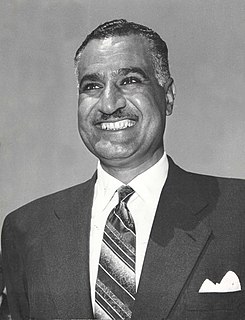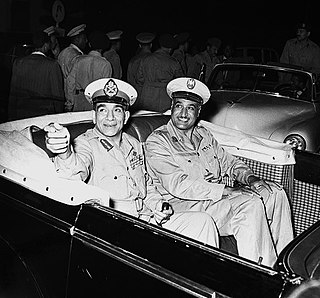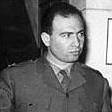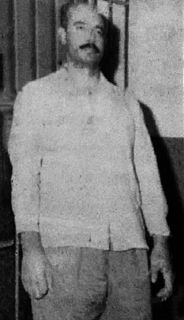
The United Arab Republic was a sovereign state in the Middle East from 1958 to 1971. It was initially a political union between Egypt and Syria from 1958 until Syria seceded from the union after the 1961 Syrian coup d'état, leaving a rump state. Egypt continued to be known officially as the United Arab Republic until 1971.

Muhammad Anwar el-Sadat was the third President of Egypt, serving from 15 October 1970 until his assassination by fundamentalist army officers on 6 October 1981. Sadat was a senior member of the Free Officers who overthrew King Farouk in the Egyptian Revolution of 1952, and a close confidant of President Gamal Abdel Nasser, under whom he served as Vice President twice and whom he succeeded as President in 1970.

Gamal Abdel Nasser Hussein was the second President of Egypt, serving from 1954 until his death in 1970. Nasser led the 1952 overthrow of the monarchy and introduced far-reaching land reforms the following year. Following a 1954 attempt on his life by a Muslim Brotherhood member, he cracked down on the organization, put President Mohamed Naguib under house arrest and assumed executive office. He was formally elected president in June 1956.

Mohamed Naguib was the first President of Egypt, serving from the declaration of the Republic on 18 June 1953 to 14 November 1954. Along with Gamal Abdel Nasser, he was the primary leader of the Egyptian Revolution of 1952, which ended the rule of the Muhammad Ali Dynasty in Egypt and Sudan.

The 'Urabi revolt, also known as the 'Urabi Revolution, was a nationalist uprising in Egypt from 1879 to 1882. It was led by and named for Colonel Ahmed 'Urabi and sought to depose the Khedive Tewfik Pasha and end British and French influence over the country. Despite a French refusal to resort to arms and the pacifist proclamations of the Gladstone administration in Britain, the uprising was ended by a British bombardment of Alexandria and invasion of the country that left it under foreign control until after World War II.

The Egyptian coup d'état of 1952, also known as the 1952 Coup d'état or July 23 revolution, began on July 23, 1952, by the Free Officers Movement, a group of army officers led by Mohammed Naguib and Gamal Abdel Nasser. The coup was initially aimed at overthrowing King Farouk.

Lu'ay al-Atassi was a senior commander in the Syrian Army and later the President of Syria between 9 March and 27 July 1963.

The 14 July Revolution, also known as the 1958 Iraqi coup d'état, took place on 14 July 1958 in Iraq, and resulted in the overthrow of the Hashemite monarchy that had been established by King Faisal I in 1921 under the auspices of the British. King Faisal II, Prince 'Abd al-Ilah, and Prime Minister Nuri al-Said were killed during the uprising.

The history of the Arab Republic of Egypt spans the period of modern Egyptian history from the Egyptian Revolution of 1952 to the present day, which saw the toppling of the monarchy of Egypt and Sudan, the establishment of a presidential republic, and a period of profound economic, and political change in Egypt, and throughout the Arab world. The abolition of a monarchy and aristocracy viewed widely as sympathetic to Western interests, particularly since the ousting of Khedive Isma'il Pasha, over seven decades earlier, helped strengthen the authentically Egyptian character of the republic in the eyes of its supporters. From then until now Egypt has always been an independent country.

Gamal Salem was a prominent member of the Egyptian Free Officers who led the Egyptian Revolution of 1952 that toppled the monarchy of Egypt and Sudan. Prior to the Revolution, he served as an officer in Royal Egyptian Air Force.

Abdel Latif Boghdadi or Abd el-Latif el-Baghdadi was an Egyptian politician, senior air force officer, and judge. An original member of the Free Officers Movement which overthrew the monarchy in Egypt in the 1952 Revolution, Boghdadi later served as Gamal Abdel Nasser's vice president. The French author Jean Lacouture called Boghdadi "a robust manager" who only lacked "stature comparable to Nasser's." The two leaders had a fallout over Nasser's increasingly socialist and pro-USSR policies and Boghdadi subsequently withdrew from political life in 1964, although he mended ties with Nasser before the latter's death in 1970.

Khaled Mohieddine was an Egyptian politician and a major in the Egyptian Army. He participated in the Egyptian Revolution of 1952, as a member of the Free Officers Movement, which overthrew the monarchy then under the rule of King Farouk.

Youssef Seddik was an Egyptian military figure and politician. He is noted for his role in launching the first military procedures in the Egyptian Revolution of 1952.

A double referendum was held in Egypt on 23 June 1956. The two issues were the candidacy of Gamal Abdel Nasser for the post of president, and a new constitution. Both were approved, with the official figures showing 99.9% in favour of Nasser's candidacy and 99.8% in favour of the constitution.

The history of Egypt under Gamal Abdel Nasser covers the period of Egyptian history from the Egyptian revolution of 1952, of which Gamal Abdel Nasser was one of the two principal leaders, spanning Nasser's presidency of Egypt from 1956, to his death in 1970. Nasser's tenure as Egypt's leader heralded a new period of modernisation and socialist reform in Egypt and a staunch advocacy of pan-Arab nationalism and developing world solidarity. His prestige in Egypt and throughout the Arab world soared in the wake of his nationalisation of the Suez Canal in 1956, and Egypt's political victory in the subsequent Tripartite Aggression, but was damaged badly by Israel's successful invasion and occupation of Egyptian and Arab territory in the Six-Day War of 1967.

Jassem Alwan was a prominent colonel in the Syrian Army, particularly during the period of the United Arab Republic (UAR) (1958–1961) when he served as the Commander of the Qatana Base near Damascus. Alwan, a staunch supporter of UAR President Gamal Abdel Nasser, opposed Syria's secession from the union in 1961, leading two failed coup attempts to overthrow the secessionist government in 1962.

Arab nationalism is a nationalist ideology that asserts the Arabs are a nation and promotes the unity of Arab people, celebrating the glories of Arab civilization, the language and literature of the Arabs, calling for rejuvenation and political union in the Arab world. Its central premise is that the peoples of the Arab world, from the Atlantic Ocean to the Indian Ocean, constitute one nation bound together by common ethnicity, language, culture, history, identity, geography and politics. One of the primary goals of Arab nationalism is the end of Western influence in the Arab world, seen as a "nemesis" of Arab strength, and the removal of those Arab governments considered to be dependent upon Western power. It rose to prominence with the weakening and defeat of the Ottoman Empire in the early 20th century and declined after the defeat of the Arab armies in the Six-Day War.

The 1969 Libyan coup d'état, also known as the al-Fateh Revolution or the 1 September Revolution, was a military coup d'état in Libya carried out by the Free Officers Movement, a group of military officers led by Colonel Muammar Gaddafi, which led to the overthrow of King Idris I.

Ali Abu Nuwar was a Jordanian army officer, serving as chief of staff in May 1956 – April 1957. He participated in the 1948 Arab–Israeli War as an artillery officer in the Jordanian army's predecessor, the Arab Legion, but his vocal opposition to British influence in Jordan led to his virtual exile to Paris as military attaché in 1952. There, he forged close ties with Jordanian crown prince Hussein, who promoted Abu Nuwar after his accession to the throne.


















